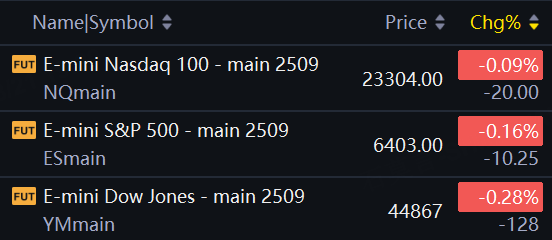Pre-Bell|Wall St Futures Slip With Fed Meet in Focus; CoreWeave Climbs 3%; Walmart Sinks over 3%; Coty Tumbles 20%

U.S. stock index futures slipped on Thursday, as investors stepped to the sidelines and awaited an earnings report from big-box retailer Walmart and clues on the Federal Reserve's next policy move from a three-day conference in Jackson Hole.
A sharp decline in technology stocks such as Nvidia, AMD, Palantir and Meta earlier this week signaled investor fears that the stocks, which have soared since April lows, are now overvalued, while Washington's growing interference in the sector has also raised alarms.
Market Snapshot
At 7:50 a.m. ET, Dow e-minis were down 128 points, or 0.28%, S&P 500 E-minis were down 10.25 points, or 0.16%, and Nasdaq 100 E-minis were down 20 points, or 0.09%.

Pre-Market Movers
Walmart reported second-quarter adjusted earnings of 68 cents a share, missing analysts' estimates of 73 cents. Revenue of $177.4 billion topped estimates of $175.9 billion. The world's largest retailer raised its fiscal-year outlook, saying it now sees net sales rising 3.75% to 4.75% from a year earlier, compared with prior guidance for a range of 3% to 4%. Walmart also said it expects adjusted earnings to range from $2.52 to $2.62 a share; the previous outlook was for $2.50 to $2.60. Shares fell 2.6%.
Palantir Technologies was rising 1.1% after shares of the artificial-intelligence data company closed lower Wednesday for a sixth-straight session. The stock has declined almost 17% over the span, which equals its longest losing streak since April 2024, according to Dow Jones Market Data. Palantir has been swept up in a selloff of expensive technology stocks, particularly those tied to AI.
Shares of Nvidia, the leading maker of AI chips, also have been pressured, falling two straight days and three of the past four trading sessions. Over the past two sessions, Nvidia had declined 3.6%, the stock's worst two-day stretch since April 21, when it fell 7.25%. In premarket trading Thursday, the stock rose 0.6%.
Chip maker Intel edged up 0.4%. Shares dropped 7% on Wednesday, the stock's worst session since July 25, when it fell 8.5%. The shares, however, have gained 19% in August as the U.S. government considers taking a sizable stake in the company, and Japan's SoftBank earlier this week announced a $2 billion investment in Intel.
CoreWeave, Inc. shares climbed 3% after it was revealed Jane Street had purchased a 5.4% stake in the artificial intelligence hyperscaler. The quantitative trading firm now holds a total of 19.99M shares of CoreWeave, according to a filing with the U.S. Securities and Exchange Commission on Wednesday.
Renewable energy stocks fell after Trump, in a social media post Thursday, said the U.S. won't approve solar or wind power projects. Solar names First Solar, Sunrun and SolarEdge Technologies fell between 1% and 3%. Shares of clean energy companies jumped last week after new rules for tax credits from the Treasury Department weren't as bad as many investors had feared.
Nordson rose 6.1%. The manufacturing company posted better-than-expected fiscal third-quarter earnings and raised fiscal-year guidance.
Coty tumbled 20% after the cosmetics company reported a fourth-quarter adjusted loss of 5 cents a share, while analysts expected a profit of 1 cent a share. Revenue in the period fell 8%. Coty said it anticipates "steady, sequential trend improvement" in like-for-like sales and adjusted earnings before interest, taxes, depreciation, and amortization through fiscal 2026, returning to growth in the second half of the year.
Hewlett Packard Enterprise rose 3% to $21.66 after analysts at Morgan Stanley upgraded the stock to Overweight from Equal Weight and raised their price target to $28 from $22.
Market News
EU, US Reach Agreement on Joint Statement Outlining Trade Deal
The US and European Union took the next steps to formalize their trade pact, detailing plans that could reduce tariffs on European automobiles within weeks while opening the door to new potential discounts for steel and aluminum.
The joint statement issued Thursday represents an advancement of the preliminary deal announced a month ago, including specific benchmarks for the EU to secure its promised sectoral tariff discounts on cars, pharmaceuticals and semiconductors, as well as new commitments for addressing the bloc’s digital services regulations.
President Donald Trump has repeatedly praised the sweeping US-EU trade framework, extolling it as “a big deal” in a Monday White House meeting with foreign leaders including European Commission President Ursula von der Leyen.
Fed Chair Contender Bullard Backs 100 Basis Points of 2025 Cuts
Former Federal Reserve Bank of St. Louis President James Bullard, a contender for the next US central bank chief, called for a percentage point of interest-rate cuts this year, with scope to do more in 2026.
“Rates are a little bit high right now, and I think we can get down about 100 basis points going into 2026 — I think that’ll start with a rate reduction here at the September meeting, and probably be followed up later this year,” Bullard said on Fox Business Thursday.
Bullard, now dean of Purdue University’s business school, said he’d been in contact with Treasury Secretary Scott Bessent about his candidacy for Fed chair, and is aiming to set up an interview with him, “probably” after Labor Day — which falls on Sept. 1.
Kuaishou’s Profit Beats Views on Momentum in Ad Business, AI Monetization
Chinese short-video app operator Kuaishou Technology reported slightly better-than-expected quarterly results as its advertising business regained momentum and its video-generation tool, Kling AI, continued to gain traction.
The Beijing-based company said Thursday that its second-quarter net profit rose 24% to 4.92 billion yuan, equivalent to $685.6 million. That beat the 4.41 billion yuan expected in a FactSet poll. Adjusting for share-based compensation expenses and net fair-value changes on investments, net profit increased 20%.
Kuaishou’s quarterly revenue climbed 13% to 35.05 billion yuan, marginally ahead of analysts’ expectations of 34.46 billion yuan.







